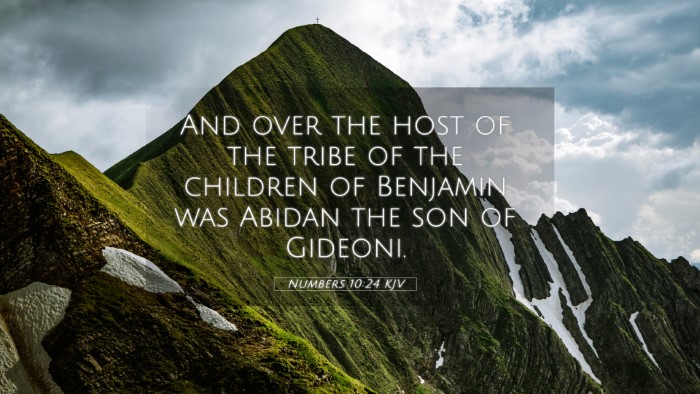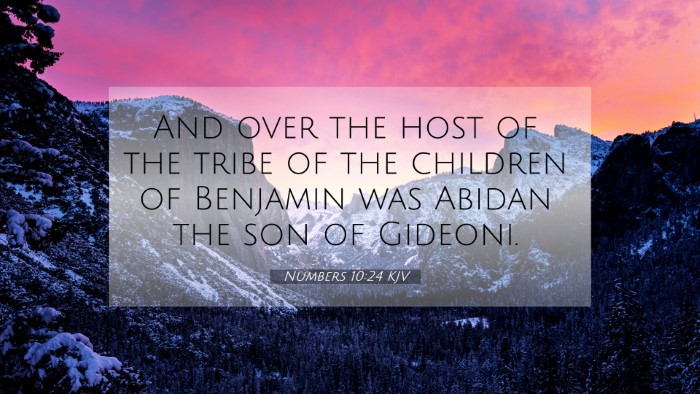Understanding Numbers 10:24
Verse: Numbers 10:24 - "And the standard of the camp of the children of Ephraim set forward according to their armies: and over his host was Elishama the son of Ammihud."
This verse serves as a part of the narrative detailing the organization and movement of the Israelites in the wilderness. It highlights the leadership structure, specifically mentioning the tribe of Ephraim, which had a significant role in the Israelite camp.
Key Themes
- Leadership and Organization
- The Role of Tribes
- Covenantal Community
Verse Meaning and Interpretation
Matthew Henry notes that this verse reflects the importance of order within the camp of Israel, emphasizing the roles assigned to each tribe as they traveled. The mention of Elishama, the leader of Ephraim, signifies the trust and responsibility given to leaders within the community.
Albert Barnes points out that Ephraim, being one of the prominent tribes of Israel, had a crucial position among the tribes. Its selection to lead in the march suggests its status and influence among the Israelites. The presence of a specific leader like Elishama further underscores the organized approach to their journey.
Adam Clarke, providing context, elaborates on the significance of the tribe of Ephraim's standard. The standards served not only as a means of identification but also as a rallying point for the people, guiding them as they moved through the wilderness. The reference to armies indicates the preparation for potential conflicts they might face during their journey.
Cross-References and Thematic Connections
In reviewing Numbers 10:24, several cross-references emerge that enrich its understanding:
- Genesis 49:22-26 - Jacob's blessings to Ephraim and Manasseh, detailing their future prominence.
- Exodus 12:37 - The departure of the Israelites, indicating a collective journey supported by tribal leadership.
- Exodus 17:8-16 - The battle with Amalek, showcasing the military readiness and tribal cooperation.
- Deuteronomy 33:13-17 - Moses’ blessings to the tribes including Ephraim, emphasizing their significance.
- Joshua 16:4-5 - The inheritance of the land by the tribe of Ephraim, highlighting their leadership role in the Promised Land.
- Psalm 78:67-68 - God's choice of Ephraim as His dwelling place, illustrating the tribe's importance in God's plan.
- Hebrews 11:32-34 - Mention of the faith of various leaders, including the Israelite tribes in their journey and struggles.
- Isaiah 7:2 - The relevance of Ephraim during prophetic messages and their critical role in Israel’s history.
Application for Today's Reader
This verse, while historical, has applications for contemporary believers. It highlights the importance of leadership and the structure within a community, be it in church or wider society. Much like the Israelites were guided by their leaders, modern communities should look to faithful leaders who carry the vision of God forward.
Moreover, understanding the connections between verses, such as those related to Ephraim, enriches personal Bible study. Readers are encouraged to explore these connections through the use of tools for Bible cross-referencing, fostering a deeper understanding of scriptural narratives.
Conclusion
Numbers 10:24 provides insight into the organized structure of Israel’s journey in the wilderness, underscoring the significance of tribes and their leaders. This verse is more than a historical note; it invites modern believers to appreciate the role of organized leadership in following God's path, while also engaging in thematic Bible verse connections that resonate through scripture.




